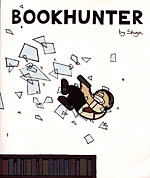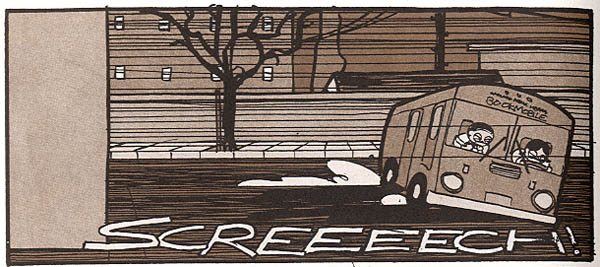 By Jason Shiga
By Jason Shiga
144 pages, two-color
Published by Sparkplug Comics
I don’t really understand how Jason Shiga’s mind works, but I’m always impressed. His comic Fleep was a brilliant mathematical puzzle combined with the ultimate locked-room mystery of a man trapped inside a phone booth encased in rock, and in some ways it’s one of his more standard creations, with books like Meanwhile and Hello World being interactive creations with a myriad of possibilities. When I saw that his new book, Bookhunter, was a pretty standard story I was prepared to be disappointed. What I got, though, was anything but disappointment.
Special Agent Bay is a member of the Library Police, tracking down perpetrators who steal, damage, and destroy library books. His greatest case yet, though, has to do with a bible from 1838 that belonged to John Quincy Adams. The Oakland Public Library has just discovered that the one they have on display was stolen and replaced with a fake—and the original is due back to the Library of Congress in just three days. Can Bay and his team use their cutting edge 1973 technology to find the bible and return it intact?

Bookhunter is the sort of book where you’re never entirely sure if you’re supposed to be laughing with the book, or laughing at it. Shiga takes the idea of the crazy action movie in Bookhunter and merges it effortlessly with the science of shows like CSI and the actual technology of 1973. The end result is ludicrous and funny, but at the same time there’s a certain level of seriousness to it. The characters themselves never crack a smile at their situation—it’s all presented very seriously and matter-of-factly. So when the teaser scene features a character propelling themselves through the air with a shotgun to stop a man threatening to set himself and a pile of stolen books on fire, you can’t help but laugh at the strangeness of the situation, even as you see the very dramatic nature of the story. Shiga raises the worth and value of books up to the level that other priceless items in the world are compared to, here, and while it provides a little bit of a disconnect for the reader, that’s a lot of the fun.
 The story itself in Bookhunter is actually quite intriguing. Shiga lets his characters puzzle things out by speaking about them, so you get a step-by-step solution to every single logic jump. This is the kind of thing that I’m used from Shiga based on his stories like Fleep; every puzzle has an answer and Shiga is willing to lead us through them. Shiga’s able to ratchet up the tension as the story progresses, and I was impressed at how even the strangest moments of the story were still able to feel exciting and interesting. (All I can say is that you’ve never found a Bookmobile so fingernail-chewing up until now.) This isn’t a book you can put down lightly.
The story itself in Bookhunter is actually quite intriguing. Shiga lets his characters puzzle things out by speaking about them, so you get a step-by-step solution to every single logic jump. This is the kind of thing that I’m used from Shiga based on his stories like Fleep; every puzzle has an answer and Shiga is willing to lead us through them. Shiga’s able to ratchet up the tension as the story progresses, and I was impressed at how even the strangest moments of the story were still able to feel exciting and interesting. (All I can say is that you’ve never found a Bookmobile so fingernail-chewing up until now.) This isn’t a book you can put down lightly.
Shiga’s characters are drawn in a very stylized format, with perfectly round heads and eyes (one can almost imagine Shiga getting out a compass to do so) with crescents for eyelids. It’s a neat sort of look to the book, and one that you quickly get used to. Shiga’s sense of motion is very much on display here, using speed lines and sound effects when necessary as people and objects are regularly propelled through the air. (Who knew a story about a stolen library book could have so much action?) It’s funny, though, in that what I feel he enjoys drawing the most in Bookhunter is the library itself; I’ve never been to the actual Oakland Public Library to see if it’s based off a real location or not, but I certainly got the impression that this is a place that Shiga has studied meticulously, drawing every last little shelf and balcony to near perfection. With the architecture always modeled carefully with its straight lines and hard edges, the look of Oakland through Shiga’s pen is an attractive place to be.
Bookhunter is one of the stranger books I’ve in the last year, and when I sat down to re-read it before writing the review it surprised me how there was almost nothing that had fallen out of my memory. It was like I’d just read Bookhunter yesterday instead of six months ago, which says how memorable the book ultimately is. I never thought I’d say it, but if Shiga wants to create more action-adventure books, I more than welcome him to it—I’ll definitely read it. By now, though, it doesn’t matter what his next project is; Shiga has proven himself to be a “buy anything he touches” kind of creator. This is one thoroughly fun book. Highly recommended.
Purchase Links:
